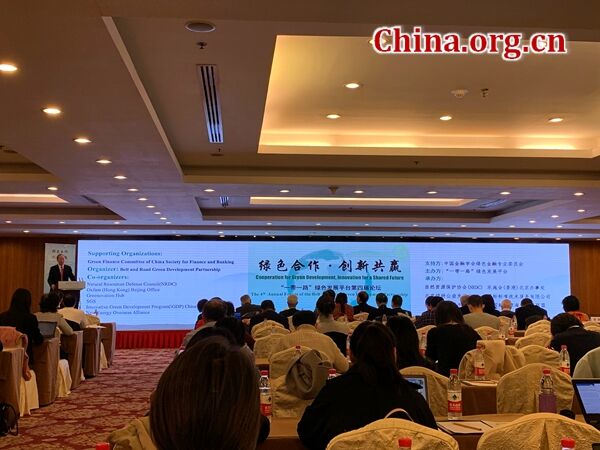Forum underscores green Belt and Road development
- By Zhang Lulu
 0 Comment(s)
0 Comment(s) Print
Print E-mail China.org.cn, October 30, 2019
E-mail China.org.cn, October 30, 2019

Officials and experts agreed that green development is essential to the Belt and Road Initiative, and they are calling for more concrete and coordinated efforts among countries involved in the initiative at the 4th Annual Forum of the Belt and Road Green Development Partnership held in Beijing on Tuesday.
Li Junyuan, deputy director general of the Belt and Road Initiative Center under the National Development and Reform Commission, said the Belt and Road Initiative has made tremendous progress since it was proposed by China six years ago. While the initiative emphasizes infrastructure connectivity and trade facilitation, green and low-carbon development is also an integral part of it.
Li's notion was echoed by Ma Jun, director of the Green Finance Committee of China Society for Finance and Banking. He said that many Belt and Road countries are environmentally vulnerable and thus need green investment to address pollution and protect their ecology and environment. Green investment, according to the former chief economist of China's central bank, refers to investment in a wide range of areas, such as clean energy, energy efficiency, sewage and solid waste treatment, green infrastructure and transportation, etc.
Ma cited estimation from the Green Finance Committee, saying that China needs 4 trillion yuan (US$566.1 billion) in green investment annually, while Belt and Road countries need US$1 trillion annually. As governments in China and other developing countries cannot afford these huge amounts of capital, much of the investment — 90% according to his estimation — will come from financial institutions. And these institutions need to take into account green principles when it comes to financing, he said.
In order to prevent environment and climate risks, Ma also called on the country's top economic planning body and environmental authorities to make it mandatory for Chinese overseas investment projects to conduct environmental impact assessments. He also said that China's export and credit insurance companies should reduce financial support for coal and coal-fired energy projects in Belt and Road countries and increase support for new energy projects in these countries.
Other experts observed that developing countries and Belt and Road countries can learn from China's experience in terms of green development.
Roli Asthana, development counsellor and head of U.K.'s Department for International Development (DFID) in China, said that since China has built "an effective ecosystem," developing countries can learn from its experience regarding green finance — not just in policies, but also in detailed regulations and financial incentives. One measure that Asthana said was worth studying: environmental targets are set for local government officials in China, leading to more incentives when it comes to green development.
Dong Zhanfeng, deputy director of the Institute of Environmental Policy of Chinese Academy of Environmental Planning under the Ministry of Ecology and Environment, said that China has accumulated much experience in balancing economic development and environmental protection over the years, including legislation, standards, policies, mechanisms, and capacity building, all of which can be studied by developing countries.
The forum was held by the Belt and Road Green Development Partnership, a collaboration between Chinese and international think tanks, environmental NGOs, and foundations.






Go to Forum >>0 Comment(s)